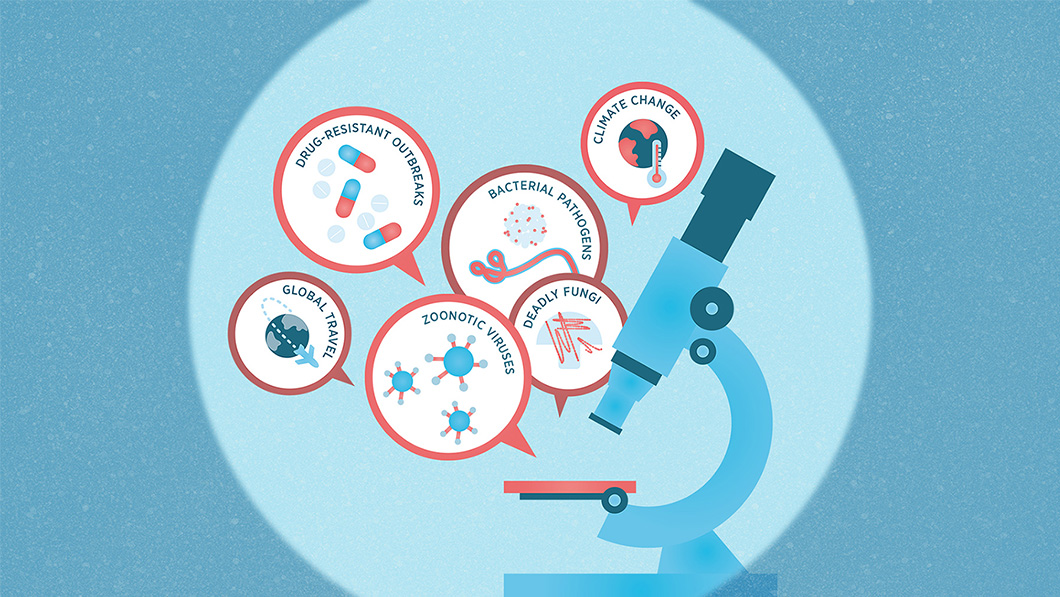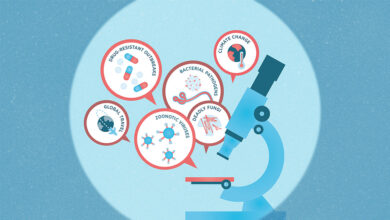
Tracking avian flu, forest fires and heat waves
Sponsored by:

PPF: Health Security
PPF’s report The Next One: Preparing Canada for another health emergency outlines the lessons learned from the pandemic and how Canada can safeguard against future health emergencies. To keep the discussion going — and to keep Canadians informed — this newsletter looks at what’s happening in the world of health security each week. Here’s what we’re following:
Bird flu watching
The U.S. Food and Drug Administration (FDA) has found no evidence of live H5N1 virus in pasteurized consumer milk products after extensive testing across 38 states. Last month the avian influenza virus was detected in dairy cows in nine states and was detected in milk. Meanwhile, the U.S. Centers for Disease Control (CDC) released details Friday showing that a Texas dairy farmer who was infected with H5N1 was not wearing respiratory or eye protection and had been exposed to cattle with symptoms similar to others on a nearby farm where H5N1 was confirmed. The CDC said the findings reinforce the need for farm workers to wear protective gear. The U.S. Department of Agriculture (USDA) has announced it will start collecting samples of beef sold at retail stores in states where dairy cows have been found to be infected with bird flu. The move is precautionary (the USDA says the American meat supply is still safe), but it will be looking to see whether any viral particles are present in the processed ground beef. The USDA also plans to collect samples of beef muscle from slaughtering facilities. Last week, the agency said it found bird flu in lung tissue of an asymptomatic cow that was slaughtered but never entered the food supply.
Questions still remain regarding how and when cows are becoming infected. While U.S. officials are pressing for more answers, some have noticed the relative silence north of the border. “I think we’re way behind the virus,” Matthew Miller, an immunologist and vaccine developer with McMaster University, who’s among the Canadians working on H5N1 research, told the CBC. Officially, the Canadian Food Inspection Agency (CFIA) maintains it has not yet detected any avian flu in Canadian cattle or other livestock — and the USDA has agreed to test animals before they cross the border. Canada should be going “all-in on prevention,” Miller told the broadcaster. “Pandemics always have the highest risk of happening when we have a virus in animals that humans are heavily exposed to.”
The Public Health Agency of Canada (PHAC) said this past week that while it lacks stockpiles of H5N1 vaccines, it “maintains agreements to secure timely access” to flu vaccines and is considering options to produce pre-pandemic vaccines.
U.K. biosecurity
The U.K. has introduced the next phase of its Border Target Operating Model (BTOM) as of April 30, changes the government says are “crucial” to improving biosecurity. In practice, this phase of the BTOM will mean that products that are considered a risk to U.K. biosecurity will be subject to new, more comprehensive checks — including visual and physical checks. Goods considered “high risk” to biosecurity will be checked at the border. Previously, these items were checked at their final destination. The BTOM was set in motion by the U.K.’s exit from the EU, but its implementation has been punted five times until its graduated introduction started earlier this year.
But as with many Brexit-related regulations, preparations have not gone smoothly and, according to POLITICO, “despite having had years to plan for the new border regime, the British government appears to have left many crucial details until the last minute.” Those details include providing port operators access to a centralized computer database that would allow them to quickly invoice importers for the new necessary checks.
Health giant, big target
UnitedHealth CEO Andrew Witty estimated during testimony at a congressional committee this past week that perhaps a third of Americans may have had their personal data stolen during a massive hack on Change Healthcare earlier this year. However, Witty said, it might be “several months” before everyone impacted finds out.
There are renewed questions about how the hack may highlight over-consolidation in the U.S. health industry. UnitedHealth bought Change Healthcare — which was itself created via a series of mergers and acquisitions — in 2022, but not before winning a legal challenge from the Justice Department, as part of the Biden administration’s antitrust agenda. In February, the Justice Department launched a fresh antitrust investigation against UnitedHealth. “As you see more and more of these mergers and gigantic health-care operations, I think you’re creating a systemic risk in terms of cybersecurity,” Senate Finance Committee Chairman Ron Wyden told Bloomberg.
No health in Ukraine aid
The major U.S. aid package that will send billions in support to Ukraine has no funds earmarked for medical assistance of any kind, including fighting infectious diseases — the spread and prevalence of which could be exacerbated by the conflict, experts and some U.S. politicians have said this week.
“We need to be ready for further disease outbreaks,” Jarno Habicht, the head of WHO’s Ukraine office, told Think Global Health. “When you have a disease outbreak, especially at a time when you have daily missiles and air alerts, then [handling it is] more difficult.”
Some politicians had pushed for specific medical uses — including childhood vaccines — to be allotted funding. Ukraine has experienced epidemics recently, including a measles outbreak that infected 115,000 people from 2017 to 2019, in which low vaccination rates were a contributing factor.
Asia heatwave impacts
A searing heatwave has engulfed much of southern Asia, forcing millions of children out of school and people from work under the threat of heat exposure. Temperatures have reached above 40C in parts of China, as high as 46C in Cambodia, Thailand, and parts of India, and a scorching 48.5C in Myanmar.
Japan, though cooler, has also seen temperatures near the 30C mark, abnormal for this early in the year. The heat is disrupting wildlife as well, including hundreds of thousands of fish that died in a reservoir in Vietnam. Beyond being a threat to people’s health and wellbeing, heatwaves have been increasingly considered potential threats to security at both national and international levels, as they threaten water availability and food sources and distribution (coral reefs, which are under unique threat to warming ocean temperatures, support an estimated 500 million people worldwide).
Here in Canada, wildfire season is already off to an early start. It began 10 days earlier than the official start date in Alberta, while B.C. has already had its first evacuation order of the season. Officials are bracing for another season of smoke over Canadian cities. The B.C. Wildfire Service has already hired 1,300 seasonal firefighters.
Events
May
- May 12-14: Bio€quity Europe. San Sebastián, Spain.
- May 13-16: AAPS 2024 National Biotechnology Conference. San Francisco, CA.
- May 13-17: PEGS Boston. Boston, MA
- May 14-16: CAHSPR 2024. Ottawa, ON.
- May 16: US Pharma and Biotech Summit. NYC, NY
- May 16: STAT Breakthrough Summit West. San Francisco, CA.
June
- June 3-6: Bio International Convention. San Diego, CA.
- June 12-13: The Festival of Genomics & Biodata. Boston, MA
- June 30-July 3: European Congress on Biosecurity. Rotterdam, Netherlands.
Did someone forward you this newsletter? Subscribe to PPF: Health Security newsletter
This newsletter is produced by journalists at PPF Media. It maintains complete editorial independence.



